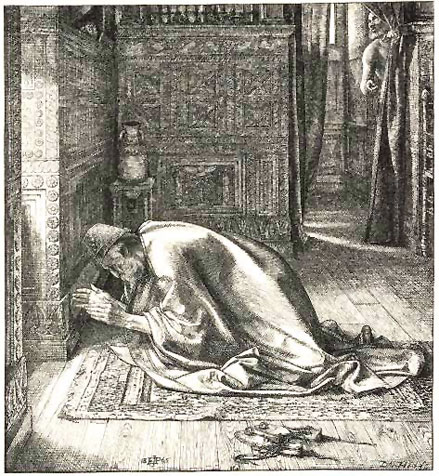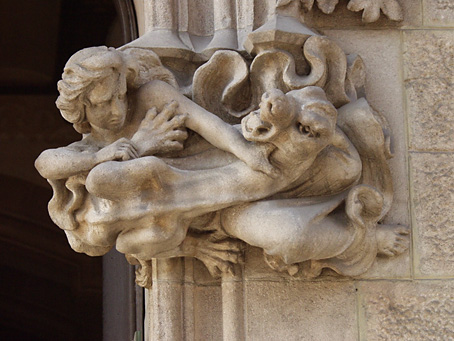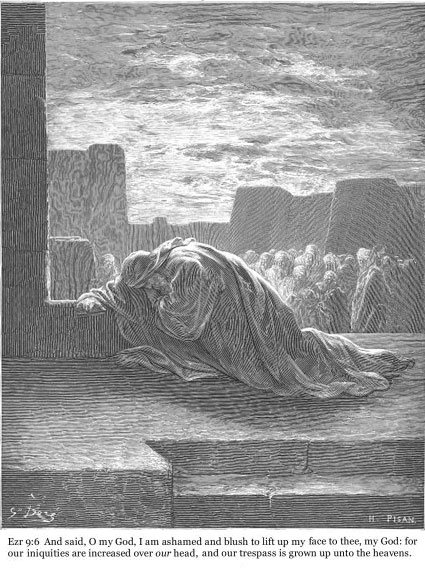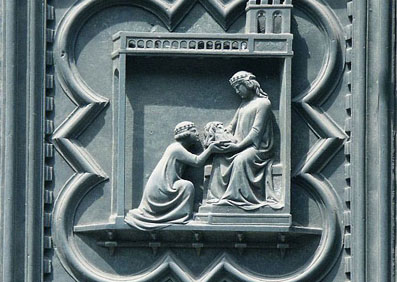Apr
10
2009
“For as often as you eat this bread and drink the cup, you proclaim the Lord’s death until He comes.”
If, as preterists maintain, Jesus came in AD70, why do you celebrate the Lord’s Supper?
To answer as an orthodox preterist (I’m sorry, but ‘partial’ doesn’t work for me), I would mention that the communion is a covenant memorial that reminds God of the covenant. The covenant is the key.
Continue reading
4 comments | tags: AD70, Communion, James Jordan, Peter Leithart, Resurrection, Revelation | posted in Against Hyperpreterism, Biblical Theology, The Last Days
Apr
10
2009
[This is based on a post by Peter Leithart, Jew – Gentile – Jew ]
In the NT, I believe Hebrews functions as a “Book of Deuteronomy.” After an “exodus” from Jerusalem (as Egypt) and time in the wilderness, the Jewish Christians scattered throughout the empire were facing the destruction of their city (as Jericho). From Hebrews to Jude, the focus of these final New Testament writings shifts from the Gentiles back to the Jews.
Gospels – to the Jew
Acts – first to the Jew, then to the Gentiles: exodus from Jerusalem
Romans to Philemon – to the Gentiles
Hebrews to Jude – to the Jews again
Revelation – destruction of Jerusalem
So there is a Jew (Leviticus), Gentile (wilderness – Numbers), Jew (Deuteronomy) pattern repeated.
The Law is being repeated by Christ as Moses “speaking from heaven” before the crossing of the foetal church into the heavenly country as a new mediatorial government. The writer of Hebrews was warning them not to die in the wilderness as their ancestors did.
Josephus tells us that the Romans beseiged the city when Jews from all over the empire were in Jerusalem for Passover. Their table became a snare.
Comments Off | tags: Hebrews, Josephus, Peter Leithart | posted in Biblical Theology, The Last Days
Apr
10
2009

A new Adam (High Priest) ruled the wild animals of the Gentile kingdoms, but without a king this rule would be truly priestly. Daniel prefigured the nature of this new kingdom: obedience would bring persecution, and suffering as witnesses before the Gentiles would be the means of Gentile conversion. A new Israel would be the initial fulfilment of the despised, suffering priestly servant of Isaiah 53. When the Lord scattered His people for their sin, He also spread them to the four winds as witnesses to the empire.
Continue reading
Comments Off | tags: Daniel, Esther, Greek philosophy, Isaiah, Mordecai, oikoumene, Peter Leithart, Power of the Gospel, Typology, Witness | posted in Biblical Theology, The Last Days, The Restoration Era
Apr
10
2009
An excellent post by Peter Leithart offers some balance for those tempted to swallow the entire anti-American propaganda hook, line and sinker.
Empires Of Trust
Thomas Madden offers a contrarian analysis of American and Roman empire in his recent book, Empires of Trust. Most empires in history, he says, “have sought to build their power in whatever way they can, making war on their neighbors when it seems advantageous and continuing to do so until stopped. They are trusted only to use power for their own benefit and to treat those they conquer as, well, conquered.”
Many believe that the Romans were the same. Not Madden.
Continue reading
Comments Off | tags: Peter Leithart, Politics | posted in Quotes
Apr
10
2009

“…the coming of the kingdom means that the saints are, in Christ, seated in heavenly places, enthroned in fulfillment of the dominion mandate. Heavenly dominion over sin and Satan is the basic form of dominion for the individual Christian. But the Bible teaches that the saints have dominion over earth as well as heaven (Rev. 5:10). Heavenly dominion is over “spiritual forces of wickedness in the heavenly places” (Eph. 6:12), but by exercising this heavenly dominion, the church rules also on earth. The rule of the church over the demons is not only subjective and spiritual, but has objective historical consequences.
Continue reading
Comments Off | tags: Compromise, Holy war, Peter Leithart, Postmillennialism | posted in Biblical Theology, Ethics
Apr
10
2009
The Old Testament surely has a measure of built-in obsolescence. But it is the obsolescence of childhood. The New Testament, the Covenant of the Man, cannot be truly understood without a detailed knowledge of the Old. A friend posted this quote from Rudolph Bultmann: “who went on to cast a large shadow of influence over 20th century theology. Bultmann argues that the whole Old Testament narrative is of no importance to the Christian faith.”
Continue reading
1 comment | tags: Biblical worldview, Bultmann, Church History, Gnosticism, Hermeneutics, Peter Leithart, Philosophy, Typology | posted in Biblical Theology
Apr
10
2009

Ezra took a great risk to bring Levites and riches to the Temple from Persia. Mixed marriages were suddenly of more concern, which poses a difficult question. Things seem to be heading backwards—away from the New Testament rather than towards it.
Continue reading
Comments Off | tags: Ezra, Nehemiah, Peter Leithart, Pharisees, Priesthood, Resurrection, Tabernacle, Temple | posted in Biblical Theology, The Restoration Era
Apr
10
2009
Jesus As Yahweh
Veli-Matti Karkkainen points out that Philippians 2:9-11 alludes to Isaiah 45:22-23, where Yahweh declares Himself to be the one and only God, before whom “every knee will bow” and by whom “every tongue will swear.” Thus, “for Paul the resurrected and exalted Christ enjoys the same status as the God of Israel.”
Peter Leithart, www.leithart.com
Comments Off | tags: Isaiah, Paul, Peter Leithart, Resurrection | posted in Biblical Theology, Quotes
Apr
10
2009
 or ‘How to Raise Monsters’
or ‘How to Raise Monsters’
Peter Leithart points out that the very early verses in John’s gospel can be corresponded with the Creation week:
DAY 1: The Light of the World (1:1-18)
DAY 2: The Baptism of John (1:19-28)
DAY 3: Jesus’ Baptism (1:29-34): dry land emerges from water, “the next day.”
DAY 4: John Points Disciples to Jesus (1:35-39)
DAY 5: Disciples Bring Brothers (1:40-42)
DAY 6: Jesus and Nathanael (1:43-51): “the following day,” the first day
DAY 7: [nothing]: Sabbath; the second day
DAY 8: The Wedding at Cana (2:1-11): “the third day”
More detail here.
It seems to be the case with many Bible books that they start off with a small seven, which is part of a larger one, which is then part of a great seven that structures the book (among other internal structures).
As with Matthew’s gospel, the next level in John covers the first few chapters, and might even solve a textual difficulty:
Continue reading
Comments Off | tags: Creation Week, Daniel, John, Peter Leithart, Priesthood, Typology | posted in Biblical Theology
Apr
10
2009

Peter Leithart observes that both Esther and Herodias’ daughter are promised up to “half the kingdom.”
There are echoes in the story of the book of Esther, at least in Mark’s version of John’s execution. Matthew tells us that when the daughter of Herodias danced before Herod, he promised with an oath to give whatever she asked. Mark records Herod’s words somewhat differently: He promises not just to give what she asks, but promises to give up to half his kingdom (Mark 6:22-23). This is the same promise that Ahasuerus gives to Esther when she says she has a request for him (5:3, 6).
In both passages, we have a woman, a queen, requesting something from a king. In both stories, we have a king promising half his kingdom. We could even say that both Esther and Herodias are asking for someone’s head. Esther knows that Haman is plotting to kill all the Jews, and she is asking for his life in order to protect the Jews.
But there the similarities end. Esther appeals to the king to save the faithful in Israel, while the daughter of Herodias is instructed instead to ask for the head of a faithful man, albeit a troubler of Herod’s kingdom, a prophet who has made life difficult for Herod because of his faithfulness. Instead of being like the protective Ahasuerus in Esther, Herod is more like Haman, seeking to wipe out the true Israel.
http://www.leithart.com/2008/06/21/herodias-and-esther/
Esther, like Deborah, and Jael, typifies Mary, the warrior bride whose offspring would crush the head of the serpent. A Nazirite growing his hair during a ‘holy war’ vow identified him with submission and purity. John uses Nazirite symbols to describe the bad Nazirites, the Judaising “locusts” troubling the church.
“And they had hair as the hair of women, and their teeth were as the teeth of lions.” Revelation 9:8 (and Joel 1:6)
They were negative-Nazirites, men who had taken vows to destroy the apostles (Acts 21:23). With the charm (and hair) of an army of Absaloms, their holy war was stamping out the Son of David. They were the false warrior bride, Herodias, seeking the head of the true Nazirite, Christ, in revenge for the victory over Goliath at the cross. This Herodias-Jezebel-Babylon of superseded Judaism would wipe out the true Israel at any cost.
Comments Off | tags: Babylon, Esther, goliath, Herodias, Jezebel, Nazirite, Peter Leithart | posted in Biblical Theology






























